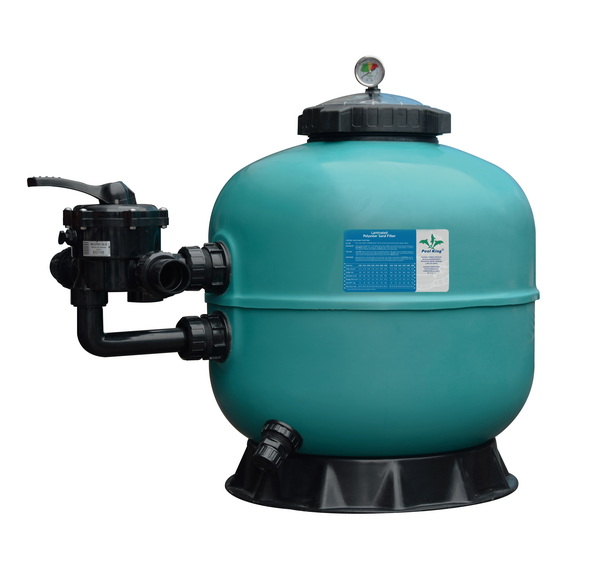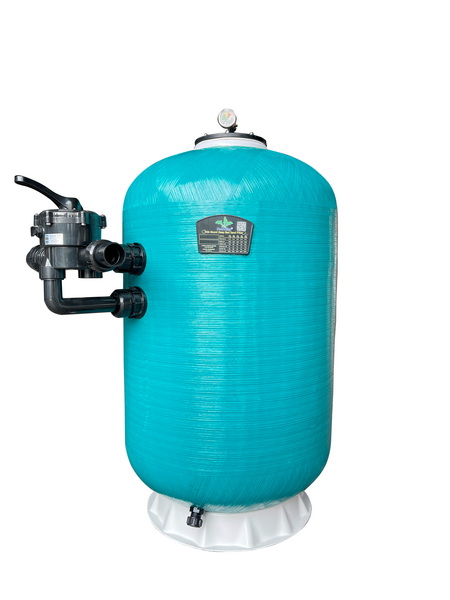Views: 222 Author: Tina Publish Time: 2025-09-09 Origin: Site








Content Menu
● What Is a Pool Filter and How Does It Work?
● Common Reasons Why Your Pool Filter Is Not Working
>> 1. Clogged or Dirty Filter Media
>> 2. Improper or Infrequent Backwashing and Cleaning
>> 5. Incorrect Valve Settings
>> 6. Low Water Levels in the Pool
>> 7. Broken or Damaged Filter Components
● How to Troubleshoot Your Pool Filter Step-by-Step
>> Step 1: Check the Pressure Gauge on the Filter
>> Step 2: Backwash or Clean Your Filter Media
>> Step 3: Inspect for Air Leaks in the Suction Lines
>> Step 4: Examine Pump Operation
>> Step 5: Verify Valve Settings
>> Step 6: Check Pool Water Level
>> Step 7: Inspect Filter Components
● Advanced Pool Filter Maintenance Tips
● Frequently Asked Questions (FAQs)
>> Q1: How often should I clean or backwash my pool filter?
>> Q2: Can I run my pool filter without backwashing?
>> Q3: Why does my pool filter pressure gauge drop too low?
>> Q4: Can a dirty pool filter cause algae buildup?
>> Q5: How long does a sand filter last?
>> Q6: What do I do if my pool filter tank is leaking?
>> Q7: Is it normal for the pool filter to make noise?
Maintaining a clean and clear swimming pool largely depends on the performance of your pool filter. If your pool filter is not working properly, your pool water can become cloudy, dirty, and unsafe. This detailed guide explains common reasons why your pool filter might not be working, how to troubleshoot the issues, and tips for proper maintenance. As a leading Chinese manufacturer specializing in top-grade sand filters and filtration solutions, along with OEM services for pool filters, water pumps, LED pool lights, and accessories, we provide expert insights to ensure your pool filtration system operates efficiently.

A pool filter is designed to remove dirt, debris, particles, and microorganisms from your pool water, keeping it clean and safe for swimming. The main types of pool filters are:
- Sand Filters: Use sand as the filtration medium. Water passes through layers of specially-formulated sand that traps dirt and particles.
- DE (Diatomaceous Earth) Filters: Use diatomaceous earth powder, which is extremely fine and absorbs very small particles, delivering superior filtration.
- Cartridge Filters: Use pleated fabric cartridges that trap debris as water flows through their folds.
The filter works by pulling water from the pool, sending it through the filtration medium where impurities are trapped, and returning clean water back to the pool. Efficient filtration not only improves water clarity but also reduces the need for chemicals and frequent cleaning.
If your pool water is unclear, dirty, or you notice poor water circulation, your filter might be malfunctioning. Here are the most common reasons why a pool filter fails to work effectively:
As your filter collects debris like leaves, dirt, sunscreen, and algae, the filter media—whether sand, DE powder, or cartridge—gets clogged, restricting water flow. This is the most frequent cause of poor filtration.
Filters need routine cleaning to function properly. Sand and DE filters require backwashing to flush out trapped particles, while cartridge filters need removal and rinsing or replacement. Neglecting this process clogs the filter and decreases efficiency.
Air entering the suction side through loose fittings, cracked hoses, or damaged seals causes the pump to lose prime. This leads to reduced water flow and poor filter performance.
The pump is the heart of the filtration system, pushing water through the filter. Problems such as worn impellers, motor failure, or obstructions can disrupt flow and pressure.
Multiport valves control the flow of water through the filter system. If they are set incorrectly, water may bypass the filter or not circulate correctly.
If the water drops below the skimmer inlet, the pump can draw air instead of water, impairing filtration.
Cracks in the filter tank, broken laterals in sand filters, or torn cartridge fabric can compromise filtration quality and cause leaks.

A functioning filter has a normal pressure range. A sudden rise in pressure (typically 8-10 psi above normal) signals that the filter is dirty and needs cleaning or backwashing. A low or fluctuating reading may indicate air leaks or pump problems.
- For sand filters, initiate the backwash process by reversing water flow to flush out trapped debris.
- For DE filters, backwash, then add fresh DE powder after cleaning the grids inside.
- For cartridge filters, remove and carefully wash the cartridge with a hose, or replace if severely damaged.
Backwashing frequency varies by usage but generally should be done every 1-2 weeks, or when pressure exceeds the recommended limit.
Air leaks manifest as bubbles in the pump basket or a hissing sound near pipe fittings. Check the pump lid O-ring, drain plugs, unions, and hose clamps. Replace worn seals and tighten attachments.
Ensure the pump motor runs smoothly without strange noises or vibrations. Clean the pump strainer basket regularly to prevent clogs from leaves and debris.
Confirm the multiport valve is in the "Filter" position, unless you are actively backwashing, rinsing, or performing other specific functions. Incorrect settings can bypass the filter entirely.
Maintain the water level at approximately halfway up the skimmer opening to ensure water intake is consistent and free of air.
Look for cracks or leaks in the filter body, damaged laterals (in sand filters), and tears or holes in cartridge elements. Repair or replace damaged parts promptly.
Proper filter care goes beyond regular cleaning to maximize efficiency and prolong service life.
- Monitor Filter Pressure: Many pool owners install remote pressure gauges or use smartphone-compatible sensors to track filter health.
- Replace Filter Media on Schedule: Replace sand every 3-5 years, DE powder after heavy use or cleaning cycles, and cartridges per manufacturer recommendations (usually yearly or biannually).
- Maintain Pool Chemistry: Balanced water chemistry reduces calcium scaling and biological growth that clog filters.
- Lubricate O-rings Annually: Silicone-based lubricant extends O-ring life in pump lids and valves.
- Use Pool Covers: Covers drastically reduce debris load, easing filter workload.
- Pre-filter Water Before Pump: Installing a leaf trap or strainer basket before the pump intake protects the system from large debris.
- Schedule Professional Inspections: Annual check-ups by pool technicians can catch hidden issues early.
Your pool filter is the cornerstone of maintaining a clean, safe, and visually appealing pool. If your pool filter stops working, identifying the root cause—whether clogged media, air leaks, faulty pumps, or incorrect valve settings—is the first step to restoring efficient filtration. Adopting a regular maintenance schedule, monitoring filter pressure, and promptly addressing problems will help you avoid costly repairs and keep your pool water crystal-clear year-round. As a professional manufacturer specializing in high-quality sand filters and filtration solutions, we emphasize the importance of proper installation, routine care, and using premium components for reliable pool performance.

A: Typically every 1-2 weeks or when the pressure gauge rises by 8-10 psi above normal operating pressure.
A: No. Backwashing or cleaning is essential to remove trapped debris to maintain proper flow and filtration efficiency.
A: This usually indicates air leaks in the suction line, a clogged pump basket, or motor/pump issues reducing flow.
A: Yes. A clogged filter reduces water circulation and filtration, allowing algae and bacteria to grow unchecked.
A: With regular maintenance, sand filters typically last between 3 to 5 years before the sand needs replacement.
A: Inspect for cracks or damage. Small cracks may be repairable with pool-safe sealants; larger damage usually requires tank replacement.
A: Some operational noise is normal, but gurgling, rattling, or banging may signal air leaks, debris in the pump, or mechanical faults.
content is empty!
